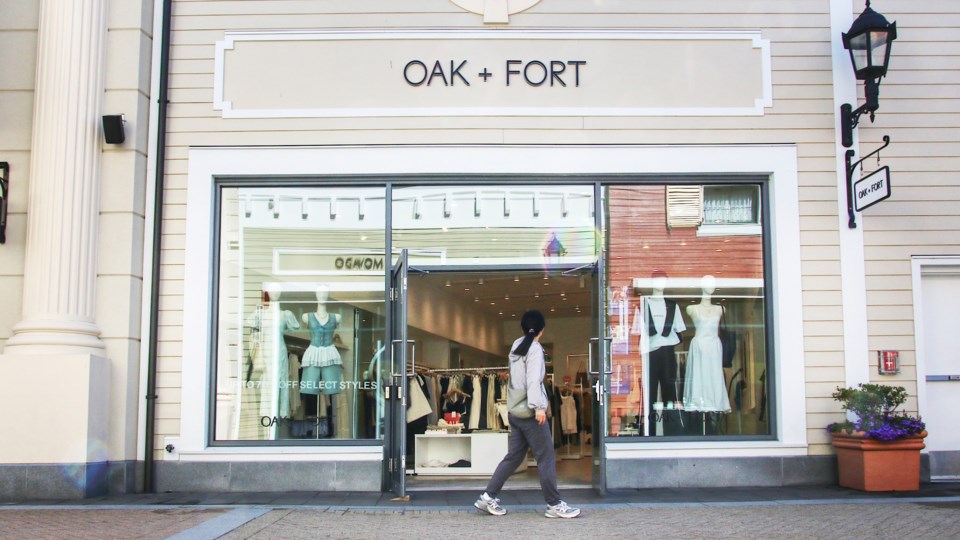Vancouver-based retailers are devising strategies to cope with global tariff uncertainty.
Many pay Asian manufacturers to make products that they then sell in Canada, the U.S. and other countries — a supply-chain strategy that has worked well for decades, but is now under pressure from the U.S.
While U.S. President Donald Trump’s unpredictable approach to trade has created uncertainty about what tariff structure could be in place months or a year from now, analysts say some retailers are using this uncertainty as a scapegoat for other underlying problems.
Vancouver’s Oak + Fort, for example, filed for creditor protection on June 6, citing rising tariffs crimping margins as part of the reason.
“The recent change in the U.S. trade landscape with tariffs have directly caused an increase in supply chain and import costs,” CEO Min Gyoung Kang said in an affidavit filed in B.C. Supreme Court.
Retail analyst David Ian Gray, however, told BIV that he believes Oak + Fort’s rapid expansion to 42 stores left it with a mountain of debt that was unsustainable for the company.
Vancouver-based Duer owns its own manufacturing facilities in Asia and CEO Gary Lenett told BIV his company is working internally to reduce costs but is already running a lean operation with its own manufacturing facilities in Pakistan.
"We do not anticipate any material hit to profit" as a result of tariffs, he told BIV.
His company is rapidly expanding sales in the U.S. and Europe.
Much larger companies are feeling the pinch.
Aritzia Inc. (TSX:ATZ) CFO Todd Ingledew was straightforward on a May earnings call about the impact of tariffs and the company’s strategies for coping with them.
“The tariffs currently being imposed by the U.S. result in just over 400 basis points of gross-margin pressure in fiscal 2026,” he said.
“To offset this pressure and work to maintain our margin, we are focused on the following:
- shifting production into countries with lower tariffs;
- partnering with our suppliers to help absorb the added costs; [and]
- realizing cost reductions from across the business.”
Ingledew added that Aritzia would be "continuing our focus on our multi-year IMU [initial mark-up] opportunities" – a suggestion that the company could hike prices.
Initial mark-up increases do not always entail price increases as it describes the difference between the production cost and the initial product retail cost.
Aritzia CEO Jennifer Wong told analysts that she was not committing to raising prices but added "we will continue with our IMU improvements, as you know that includes, you know, evaluating our prices, but the most, the majority of that is driven on the cost side."
Gray said the strategies Ingledew mentioned are likely being used across the apparel-retail sector.
Aritzia also likely has clout when trying to extract better deals from its suppliers, he said.
“If it is for commoditized products, and there are alternatives, they have a crap load of leverage,” Gray said.
Executives at Vancouver’s Lululemon Athletica Inc. (Nasdaq:LULU) are similarly strategizing about how to deal with tariffs and tariff threats.
They watched their company’s share price tank about 23 per cent after it released weak guidance, in part due to U.S. tariffs on its Asian-made goods.
Lululemon CFO Meghan Frank told investors on a June 5 conference call that she expected the company’s overall profit margin to decline by 110 basis points, notably above the 60-basis-point decline the yogawear maker had previously forecast.
“We expect the additional 50 basis points of deleverage to be driven predominantly by increased tariffs,” Frank said.
“When looking specifically at tariffs, the assumptions we’ve made regarding rates include 30-per-cent incremental tariffs on China, and an incremental 10 per cent on the remaining countries where we source.”
Lululemon CEO Calvin McDonald then discussed strategies his company could employ.
“Our teams have been looking across the enterprise for how we can offset increased tariff rates,” he said. “Our work streams include prudently managing expenses, identifying efficiencies within our supply chain and evaluating our position in the marketplace related to pricing.”
Gray said companies should have already been managing expenses and seeking to make supply chains as efficient as possible.
He said he believes that companies such as Lululemon will also follow the example of the world’s largest clothing retailer, Zara.
Zara, he said, has said it plans to spread tariff costs in one country across its entire global distribution. That would mean lower prices in the U.S. than would otherwise be the case, but higher prices in other countries, Gray explained.





